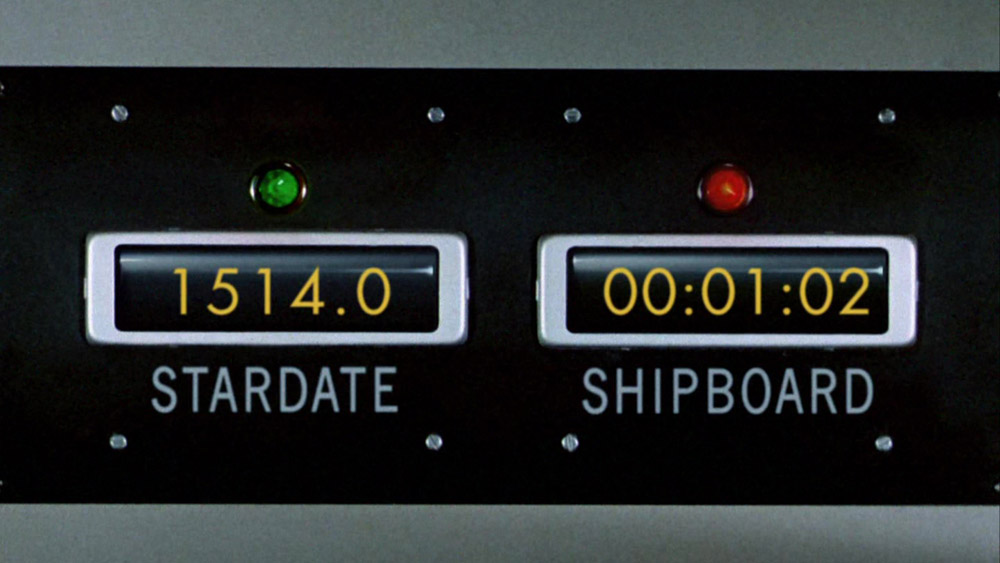Difference between revisions of "time"
From Trekipedia
(Created page with "{{ImageInfoBox2|name=time|file=chronometer-tos02.jpg|caption=A chronometer (TOS 02)}} {{TableRow|title=Advertising|...") |
m |
||
| Line 5: | Line 5: | ||
==Second== | ==Second== | ||
A second was a measure of time, and the baseline of [[Humans|Human]] time measurements.<ref name="TOS01"/> | A second was a measure of time, and the baseline of [[Humans|Human]] time measurements.<ref name="TOS01"/> | ||
| + | <btn class="btn-primary">https://en.wikipedia.org/wiki/Second|Wikipedia</btn> | ||
==Minute== | ==Minute== | ||
A minute consisted of sixty seconds.<ref name="TOS01"/> On [[Stardate]] [[2266#SD1514|1514.0]], [[Balok]] issued an ultimatum, stating that the [[U.S.S. Enterprise NCC-1701|U.S.S. ''Enterprise'' NCC-1701]] would be destroyed, and that he was granting "ten Earth time periods known as minutes to make preparations."<ref name="TOS02"/> | A minute consisted of sixty seconds.<ref name="TOS01"/> On [[Stardate]] [[2266#SD1514|1514.0]], [[Balok]] issued an ultimatum, stating that the [[U.S.S. Enterprise NCC-1701|U.S.S. ''Enterprise'' NCC-1701]] would be destroyed, and that he was granting "ten Earth time periods known as minutes to make preparations."<ref name="TOS02"/> | ||
| + | <btn class="btn-primary">https://en.wikipedia.org/wiki/Minute|Wikipedia</btn> | ||
==Hour== | ==Hour== | ||
An hour consisted of sixty minutes.<ref name="TOS01"/> | An hour consisted of sixty minutes.<ref name="TOS01"/> | ||
| + | <btn class="btn-primary">https://en.wikipedia.org/wiki/Hour|Wikipedia</btn> | ||
==Day== | ==Day== | ||
A day was the amount of time that it took a planet to complete a rotation on its axis. On [[Earth]], a day was 24 hours long.<ref name="TOS01"/> | A day was the amount of time that it took a planet to complete a rotation on its axis. On [[Earth]], a day was 24 hours long.<ref name="TOS01"/> | ||
| + | <btn class="btn-primary">https://en.wikipedia.org/wiki/Day|Wikipedia</btn> | ||
==Year== | ==Year== | ||
A year was the amount of time that it takes for a planet to complete a [[orbit|revolution]] around its parent star. One year on [[Earth]] was 365 days,<ref name="TOS01"/> and was used as the basis for a year of the [[Stardate]] system introduced in [[2322]].<ref name="TNG1"/> | A year was the amount of time that it takes for a planet to complete a [[orbit|revolution]] around its parent star. One year on [[Earth]] was 365 days,<ref name="TOS01"/> and was used as the basis for a year of the [[Stardate]] system introduced in [[2322]].<ref name="TNG1"/> | ||
| + | <btn class="btn-primary">https://en.wikipedia.org/wiki/Year|Wikipedia</btn> | ||
{{References}} | {{References}} | ||
Revision as of 17:31, 4 September 2021
Second
A second was a measure of time, and the baseline of Human time measurements.[1]
Minute
A minute consisted of sixty seconds.[1] On Stardate 1514.0, Balok issued an ultimatum, stating that the U.S.S. Enterprise NCC-1701 would be destroyed, and that he was granting "ten Earth time periods known as minutes to make preparations."[2]
Hour
An hour consisted of sixty minutes.[1]
Day
A day was the amount of time that it took a planet to complete a rotation on its axis. On Earth, a day was 24 hours long.[1]
Year
A year was the amount of time that it takes for a planet to complete a revolution around its parent star. One year on Earth was 365 days,[1] and was used as the basis for a year of the Stardate system introduced in 2322.[3]
Notes and References
- ↑ 1.0 1.1 1.2 1.3 1.4 Roddenberry, Gene (Executive Producer). "The Cage". Star Trek, season 0, episode 0 (Production number 01). Directed by Robert Butler. Written by Gene Roddenberry. Released 1986. Desilu Productions. 1965.
- ↑ Roddenberry, Gene (Executive Producer). "Where No Man Has Gone Before". Star Trek, season 1, episode 3 (Production number 02). Directed by James Goldstone. Written by Samuel A. Peeples. Desilu Productions. 22 September 1966.
- ↑ Roddenberry, Gene (Executive Producer). Star Trek: The Next Generation, season 1. Co-Executive Producers: Rick Berman & Maurice Hurley. Paramount Pictures. 1987-1988.

